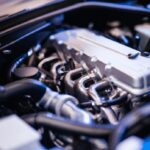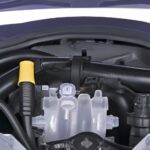Table of Contents
Understanding Your Fuel Pump: How it Works and Why it’s Important
Your fuel pump is a crucial component of your vehicle’s fuel system, responsible for delivering gasoline from the gas tank to the engine. In this article, we’ll take a closer look at how your fuel pump works and why it’s so important to the overall performance of your vehicle.
You may, or may not, know what a fuel pump or what it does. So if you are in the latter camp, keep reading as we will do our best to explain it to you, and even have a video to show how fuel pumps work/
The Basics of Fuel Pump Operation
At its most basic level, a fuel pump is a mechanical or electric device that uses pressure to move gasoline from the gas tank to the engine. The pump is typically located inside the gas tank, although some vehicles have an external pump located near the tank.
The pump is powered by either the vehicle’s battery or an external power source, and it uses a series of valves and passages to move the fuel from the tank to the engine. The fuel is then delivered to the engine through a series of fuel injectors, spraying it into the combustion chamber where it can be ignited.
Importance of Fuel Pump for Engine Performance
The fuel pump plays a crucial role in ensuring that your vehicle’s engine performs at its best. Without a properly functioning fuel pump, your engine will not receive the fuel it needs. This will lead to poor performance, decreased fuel efficiency, and even engine damage.
Additionally, a faulty fuel pump can cause some other problems, including:
- Difficulty starting the engine
- Stalling or misfiring while driving
- Reduced power and acceleration
- Decreased fuel efficiency
How to Keep Your Fuel Pump in Good Working Condition
To ensure that your fuel pump is in good working condition, it’s important to take good care of your vehicle overall. This includes regular oil changes, tune-ups, and other routine maintenance.
It’s also important to know the warning signs of a failing fuel pump, such as difficulty starting the engine or decreased power and acceleration. If you notice any of these symptoms, it’s important to have your vehicle checked by a professional as soon as possible.
Conclusion
Your fuel pump is a crucial component of your vehicle’s fuel system, responsible for delivering gasoline from the gas tank to the engine. By understanding how your fuel pump works and why it’s so important to the overall performance of your vehicle, you can take the necessary steps to keep it in good working condition and avoid costly repairs down the road.
Car Fuel Pump FAQs
Where does the fuel pump get its power from?
The fuel pump is powered by the vehicle’s battery or an external power source.
How do I know if my fuel pump relay is blown?
The engine may not start or stall while running if the fuel pump relay is blown. If you suspect that the relay is blown, it’s best to have the vehicle checked by a professional.
How do you diagnose a fuel pump problem?
To diagnose a fuel pump problem, a professional will use a pressure gauge to check the fuel system’s pressure. They may also perform various other tests to check the electrical system and the pump itself.
What does a fuel pump do when it’s going bad?
When a fuel pump is going bad, it may struggle to deliver fuel to the engine, leading to poor performance, decreased fuel efficiency, and even engine damage.
Can you reset your fuel pump?
It’s not possible to reset a fuel pump. If it’s not working, it’s likely due to a problem with the electrical system or a mechanical failure.
How many years does a fuel pump last?
A fuel pump can last 5-7 years, depending on usage and maintenance.
What is the average life of a fuel pump?
The average life of a fuel pump is around 5-7 years.
Can a fuel pump work sometimes and not others?
A fuel pump may work sometimes and not others if it is beginning to fail. It’s important to have the pump checked by a professional if you notice this issue.
Can you tap on a fuel pump to get it to work?
Tapping on a fuel pump is unreliable for getting it to work. If the pump is not working, it’s likely due to a problem with the electrical system or a mechanical failure.
What are the signs of a weak fuel pump?
The signs of a weak fuel pump include difficulty starting the engine, stalling or misfiring while driving, reduced power and acceleration, and decreased fuel efficiency.
What error codes can occur due to fuel pump issues?
The P1250 error code is a common code associated with fuel pump issues.



